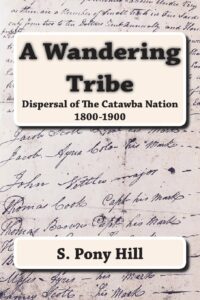NOTE: THIS WEBSITE IS A WORK IN PROGRESS. RESOURCES AND DATA ARE ADDED DAILY.
IMPORTANT: We are in urgent need of funding to keep this project alive and ensure its future. If you’re enjoying the site and see our vision for the project, please consider joining as a paid member or contributing to our crowdfunding campaign today. It is only with your help that we can continue this work.
Thanks so much for your support! – Jes
![]()
A Wandering Tribe: Dispersal of the Catawba Nation in the Eighteenth and Nineteenth Centuries
share:
Some buttons on this page link to external websites. If you visit one of our affiliate sites and make a purchase, I may receive a small commission at no extra cost to you. More info
- UPDATED: 6.17.2025
- status: to be worked, high-priority
- Migration, Indigenous History, History, Populations
author:
Steven Pony Hill
editor:
n/a
publisher:
date:
3.2.2018
ISBN:
9780939479498
pages:
212
notes:
contents:
description:
While thousands of pages have been dedicated to memorializing the history of those Catawba who remained, the pen of the historian has remained silent in regard to those Indian families and individuals who left the reservation. What happened to those Catawba who abandoned their ancient homeland? Where did they ultimately settle down? Did they continue to self-Identify as “Catawba” or, in some respects even more importantly, were they recorded as “Catawba” or even as “Indian” by the census enumerator, tax collector, or court officials in these new areas? This book attempts to answer these questions, and memorialize the documentation of those who became “A Wandering Tribe.”
peoples:
CMOS:
author-date:

